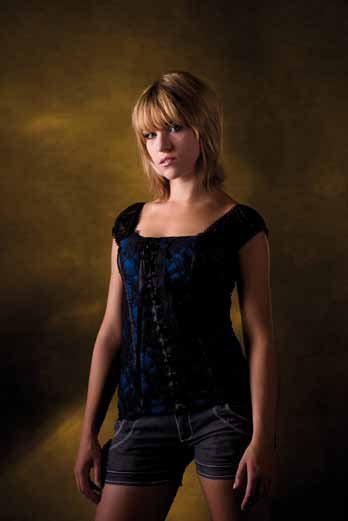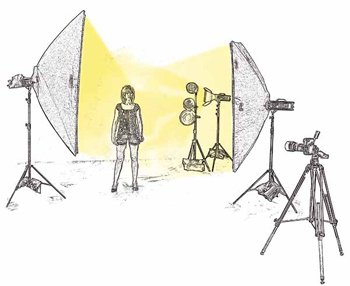articles/Lighting/pieplate-page1
Lighting for digital Dave Montizambert - The Pie Plate Illusionist - part 1 of 1 2 3 4
by Dave Montizambert Published 01/12/2009

1
There is nothing more stimulating for the right side of the brain than to practice the fine art of winging it. This image of model Cheyanne Peters, see Image 1, was embarked upon with nothing more than a vague idea that I should create a simple fashion portrait against an interesting background. The backdrop that I had to work with was a plain, dyed, muslin, see Image 3. Normally, portrait backgrounds are photographed as they are, instead of evenly lit and correctly exposed. My idea was to use the subtle, dyed shapes of the muslin as a starting point and then bastardise reality with uneven lighting, incorrect exposure, and bad white balance.
You are probably thinking, wow, what a freak; what gives him the right to mess with reality! Perhaps, but reality is man-made and I easily fall prey to ennui and so I live by the unusual rather than the usual. Anyhow, uneven lighting with gradual transitions from light to dark can create the illusion of depth on a flat surface like our dyed muslin. This principle gave me an unusual idea, reflect light off several disposable aluminum foil pie and turkey baking plates. Aluminum foil makes a highly efficient reflector of light, but since it does not possess a perfectly smooth surface like a mirror, it tends to project a soft edged spot light pattern, in other words, small patterns of light with soft transitions from light to dark. Foil pie and turkey plates are better suited for making larger patterns of light than foil pieces from aluminum foil rolls since they are thicker and so are more rigid. This extra rigidity allows a larger piece of foil to hold its shape once you bend, twist, or bow its form to customise the shape of the projected nebulous light pattern.

2
To understand the creation of the background more clearly let's take a look at the lighting in its entirety, from beginning to end.
• When lighting I always start by first establishing my shooting aperture. I chose f8 to ensure that Cheyanne would stay in focus even as she danced through her poses.
• Soft wraparound lighting was created on Cheyanne (see Image 3) with a Lightrein LR12 1200WS mono-block studio strobe fitted with a Lightrein 40x56 inch soft-box. This source was positioned to the camera left side of Cheyanne at a distance of approximately four feet, see Image 2 for the setup diagram. The power control on this light was dialed up and down until it read f8 (incident meter reading with the back of the meter placed against Cheyanne's face and the dome pointed at the main light).
You are currently on page 1
- Lighting for digital Dave Montizambert - The Pie Plate Illusionist page 1
- Lighting for digital Dave Montizambert - The Pie Plate Illusionist page 2
- Lighting for digital Dave Montizambert - The Pie Plate Illusionist page 3
- Lighting for digital Dave Montizambert - The Pie Plate Illusionist page 4
1st Published 01/12/2009
last update 09/12/2022 14:57:58
More Lighting Articles
There are 0 days to get ready for The Society of Photographers Convention and Trade Show at The Novotel London West, Hammersmith ...
which starts on Wednesday 15th January 2025





